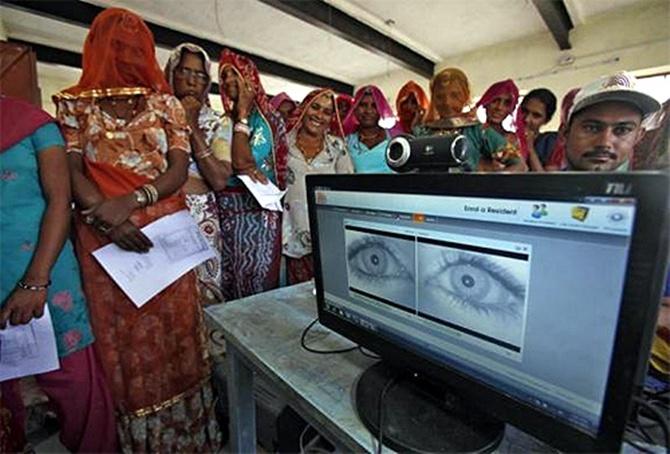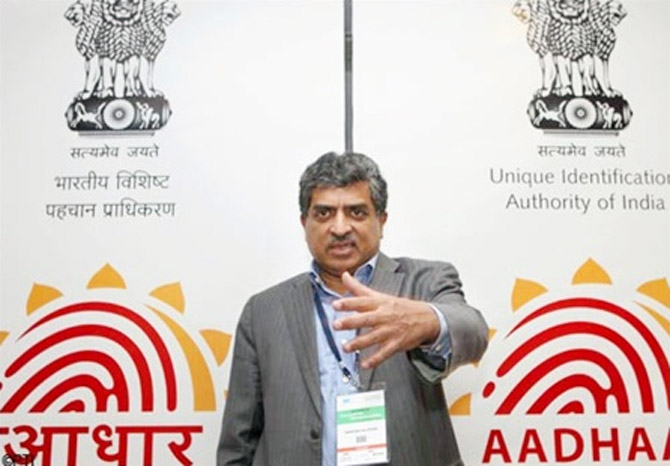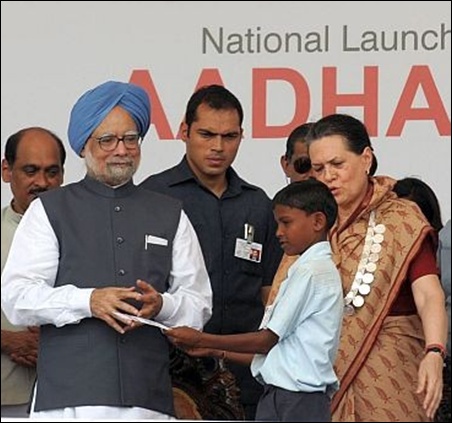Photographs: Mansi Thapliyal/Reuters
Aadhaar card could serve as a platform for innovations in health sector.
It can help to create a national portable health record system that can help monitoring epidemics and drug efficacy, Unique Identification Development Authority of India chairman Nandan Nilekani said on Friday.
Speaking at ‘Indo-US Startup Accelerator Workshop’ organised by Federation of Indian Chambers of Commerce and Industry, Department of Science and Technology and the US Embassy, Nilekani said a possible innovation in the health sector is creation of digitalised health records of individuals, which could be linked to Aadhaar card.
He said Aadhaar card can help in creating national portable health record system.
"You may travel, somebody may have an ailment in one town and they may go to a doctor in another town, they may switch their service providers.
. . .
Once again, Nilekani justifies Aadhar!
Image: Nandan Nilekani.Photographs: Reuters
“So basically you need a way to have mobility to have electronic health information.
"That is something we think that can be done using the Aadhaar card because you can just link your electronic health record to your ID and then keep that on the card and wherever you go you can authorise that particular party (who is building the record system) to use your health record for the purpose of medical care or diagnosis," he said.
He said the system could be beneficial and effective because of the volume of an individual's health history.
"Healthcare reform is very difficult to do because of massive and complex system.
You need to keep people's healthcare record electronically because health records could be voluminous because you have X-Rays, magnetic resonance imagings and ultrasounds to be stored and you have to do digitally."
. . .
Once again, Nilekani justifies Aadhar!
He, however, cautioned that this system should ensure that privacy of an individual is not encroached upon.
"We need to make sure that the information is private and therefore a person should have a control on his own health record and they should be deciding whether the health record should be recorded with somebody else," he said.
Nilekani said the system can also be used to study medical trends like epidemics and drugs efficacy.
"This will also help in big data analysis in epidemics, pandemics and drug efficacy and therefore we need to analyse this big data behaviour.
So you need to have this health records, but with sufficient privacy constraints so that information is available for this kind of non-personal information for analysis," he said.
. . .
Once again, Nilekani justifies Aadhar!
Image: A villager goes through the process of a fingerprint scanner for the Unique Identification (UID) database system at an enrolment centre at Merta district in Rajasthan.Photographs: Mansi Thapliyal/Reuters
He noted that there are several other sectors in which Aadhaar card could be used.
He noted that so far around 48.5 crore (485 million) UIDAIs have been issued and by March 2014, some 60 crore (600 million) UIDAIs could be issued.
He informed that more than 20 million transactions have taken place using the Aadhaar card this year.
Secretary, Department of Science and Technology, T Ramasami, said his department encourages new innovations.
He stated that 66 business incubations (ideas and projects) supported by the department, led to the birth of 2,600 start-up companies and 29,000 jobs.
He added that the Indo-US engagement in promoting innovations were earlier in few millions USD, but it has now grown to over $220 millions.
. . .
Once again, Nilekani justifies Aadhar!
Image: A girl walks past Aadhaar posters.Photographs: Kind courtesy, UIDAI
US Ambassador to India Nancy Powell said since 2006, of the total immigrants in the US, who co-founded engineering and technology companies, one third were Indians.
"Innovating entrepreneurship forms a basis of economic growth in both India and US and plays key role in our strategic programme.
A study by Kauffman Foundation since 2006 found that one-third of the co-founders of engineering and technology firms founded by immigrants in the United States were Indians," Powell said.
Noting that the entrepreneurs in clean energy, medical, advance manufacturing, information technology, robotics, nano technology would be the ones to build the new industries of the 21st century and solve some of global challenges, she said the government should provide a conducive environment for an eco-system.
. . .
Once again, Nilekani justifies Aadhar!
Photographs: Rediff Archives
"It is for the government and private stake holders to provide support to entrepreneurs so that they can bring their products to markets," she said.
She added that Startup America in the US, an initiative by the White House, existed to accelerate entrepreneurship within the country.
The programme is a joint co-ordinated effort by the government, the private sector and universities. She noted that many Indian entrepreneurs are involved in this programme. Powell said the US has been partnering with India to promote entrepreneurship.
"The US-India Science and Technology Endowment Fund provides seed capital to promising innovations. So far it has awarded nine grants including 2 for young entrepreneurs."
US Indian Millennium Alliance, a joint initiative of US Agency for International Development, Federation of Indian Chambers of Commerce and Industry and the government of India support Indians and Indian innovations to help develop solution to technological challenges in the country and around the world. Nine winners were awarded under this programme last year.







article